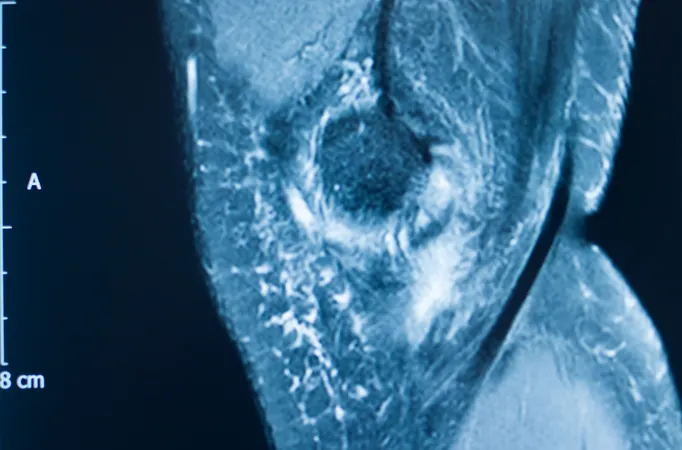
Shocking Delays in Cancer Treatment Access in Ireland: Why Patients Are Left Waiting
2025-05-07
Author: Mei
Patients Face Unacceptable Wait Times for Cancer Treatments
Imagine waiting nearly two years for critical cancer treatments! In Ireland, patients are facing a staggering average delay of 644 days after a drug receives European Medicines Agency (EMA) approval. Alarmingly, this wait is 55 days longer than last year and surpasses the EU average of 586 days.
Systemic Issues Exposed by New Report
A recent report from IQVIA, commissioned by the European Federation of Pharmaceutical Industries and Associations (EFPIA), sheds light on these significant delays. The push for improvement is further intensified by ongoing trade negotiations and a focus on Ireland's pharmaceutical industry, which is known for its success in exports.
Staggering Availability of New Treatments
Despite being a leading player in pharmaceutical exports, Ireland ranks poorly compared to other Western European countries when it comes to access to newly licensed cancer treatments. A shocking 75% of the 56 new cancer medicines approved since 2020 are not available to Irish patients. In contrast, patients in other Western European nations enjoy much broader access to these life-saving drugs.
Calls for a Major Overhaul in the System
Critics are calling for essential reforms within Ireland's reimbursement system. The Irish Pharmaceutical Healthcare Association (IPHA) emphasizes that the upcoming expiration of the current agreement is an opportunity to revamp the system for quicker, fairer access to new medications.
Government Acknowledges Problems and Allocates Funding
Ireland's Department of Health (DoH) has recognized the urgency of this issue, recently allocating €128 million for new medications through their budgets for 2021-2024. This investment has led to the approval of 194 new treatments, including 74 for cancer and 49 for rare diseases.
A Broken Reimbursement Process?
Despite these efforts, the reimbursement process remains stagnant. The DoH states that decisions are bound by criteria related to efficacy, public health needs, and budget impacts. However, a recent review found that 86% of the medicines approved between 2022 and 2024 took longer than the mandated 180-day decision timeline.
Urgent Reforms Needed for Timely Access
Oliver O’Connor, CEO of the IPHA, argues that real reforms are crucial. He insists that Ireland must adhere to its own regulatory timelines, emphasizing that patients deserve better access to potentially life-saving treatments. The health minister’s commitment to addressing these delays will soon be put to the test.
Looking to Other Countries for Solutions
The experiences of other nations that have managed to reduce medicine access times—while maintaining budgetary control—serve as a blueprint for Ireland. As the current framework nears its end, there’s a vital window to create changes that can ensure faster availability of new cancer drugs for Irish patients.
A Tough Sell for Politicians
How can Ireland, a leader in pharmaceutical manufacturing, explain these dismal wait times to its citizens? As the pressure builds on Health Minister Jennifer Carroll MacNeill to deliver results, there’s a renewed call for a more efficient and responsive healthcare system that aligns with Ireland’s pharmaceutical strengths.
A Promising Path Forward
The DoH remains optimistic, with plans to support the reimbursement process and recruit additional staff to enhance its efficiency. As stakeholders call for collaboration between health authorities and pharmaceutical companies, the hope is that Ireland can become a model for timely access to cancer treatments—one that truly cares for its patients.






 Brasil (PT)
Brasil (PT)
 Canada (EN)
Canada (EN)
 Chile (ES)
Chile (ES)
 Česko (CS)
Česko (CS)
 대한민국 (KO)
대한민국 (KO)
 España (ES)
España (ES)
 France (FR)
France (FR)
 Hong Kong (EN)
Hong Kong (EN)
 Italia (IT)
Italia (IT)
 日本 (JA)
日本 (JA)
 Magyarország (HU)
Magyarország (HU)
 Norge (NO)
Norge (NO)
 Polska (PL)
Polska (PL)
 Schweiz (DE)
Schweiz (DE)
 Singapore (EN)
Singapore (EN)
 Sverige (SV)
Sverige (SV)
 Suomi (FI)
Suomi (FI)
 Türkiye (TR)
Türkiye (TR)
 الإمارات العربية المتحدة (AR)
الإمارات العربية المتحدة (AR)